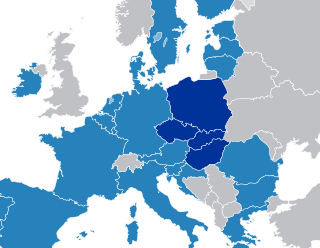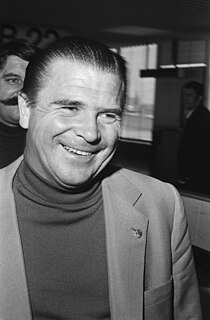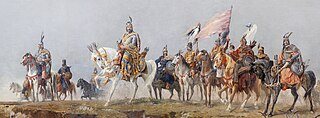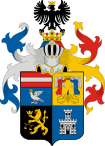
Austria-Hungary, often referred to as the Austro-Hungarian Empire or the Dual Monarchy, was a constitutional monarchy in Central and Eastern Europe from 1867 to 1918. It was formed by giving a new constitution to the Austrian Empire, which devolved powers on Austria (Cisleithania) and Hungary (Transleithania) and placed them on an equal footing. It broke apart into several states at the end of World War I.

The Visegrád Group, Visegrád Four, or V4 is a cultural and political alliance of four Central European states – the Czech Republic, Hungary, Poland and Slovakia, that are members of the European Union (EU) and NATO – for the purposes of advancing military, cultural, economic and energy cooperation with one another along with furthering their integration in the EU.

Budapest is the capital and the most populous city of Hungary, and the tenth-largest city in the European Union by population within city limits. The city had an estimated population of 1,752,704 in 2016 distributed over a land area of about 525 square kilometres. Budapest is both a city and county, and forms the centre of the Budapest metropolitan area, which has an area of 7,626 square kilometres and a population of 3,303,786, comprising 33 percent of the population of Hungary.

Imre Kertész was a Hungarian author and recipient of the 2002 Nobel Prize in Literature, "for writing that upholds the fragile experience of the individual against the barbaric arbitrariness of history". He was the first Hungarian to win the Nobel in Literature. His works deal with themes of Nazi Holocaust, dictatorship and personal freedom. He died on 31 March 2016, aged 86, at his home in Budapest after suffering from Parkinson's disease for several years.

Ferenc Puskás was a Hungarian footballer and manager, widely regarded as one of the greatest players of all time and he is the son of former footballer Ferenc Puskás Senior. A prolific forward, he scored 84 goals in 85 international matches for Hungary, and 514 goals in 529 matches in the Hungarian and Spanish leagues. He became an Olympic champion in 1952 and led his nation to the final of the 1954 World Cup where he was named the tournament's best player. He won three European Cups, 10 national championships and 8 top individual scoring honors. In 1995, he was recognized as the top scorer of the 20th century by the IFFHS.
The Hungary national football team represents Hungary in international football and is controlled by the Hungarian Football Federation.

Viktor Mihály Orbán is a Hungarian politician serving as Prime Minister of Hungary since 2010. He also served as Prime Minister from 1998 to 2002. He is the present leader of the national conservative Fidesz party, a post he has held since 2003 and, previously, from 1993 to 2000.
The Nemzeti Bajnokság is the Hungarian professional league for association football clubs. The league is currently known as the OTP Bank Liga for sponsorship reasons, and it has been the highest level of the professional league since its inception in 1901. UEFA currently ranks the league 36th in Europe.

Vasas SC[ˈvɒʃɒʃ] is one of Hungary's major sports clubs. Most of its facilities are situated in Budapest's 13th district in the north of the town. Members of the Hungarian Union of Iron Workers founded the club as Vas-és Fémmunkások Sport Clubja, the "Sport Club of Iron and Metal Workers", on 16 March 1911. The club colours are red and blue.

Dobos torte or Dobosh is a Hungarian sponge cake layered with chocolate buttercream and topped with caramel. The layered pastry is named after its inventor, Hungarian chef József C. Dobos, a delicatessen owner in Budapest. In the late 1800s, he decided to create a cake that would last longer than other pastries in an age when cooling techniques were limited. The round sides of the cake are coated with ground hazelnuts, chestnuts, walnuts, or almonds, and the hardened caramel top helps to prevent drying out, for a longer shelf life.
This article includes current squads of Hungary U-20 and U-19 national football teams.

Hungarians, also known as Magyars, are a nation and ethnic group native to Hungary and historical Hungarian lands who share a common culture, history and language. Hungarians belong to the Uralic-speaking peoples. There are an estimated 14.2–14.5 million ethnic Hungarians and their descendants worldwide, of whom 9.6 million live in today's Hungary. About 2.2 million Hungarians live in areas that were part of the Kingdom of Hungary before the Treaty of Trianon and are now parts of Hungary's seven neighbouring countries, especially Slovakia, Ukraine, Romania, Serbia, Croatia, Slovenia and Austria. Significant groups of people with Hungarian ancestry live in various other parts of the world, most of them in the United States, Canada, Germany, France, the United Kingdom, Brazil, Australia, and Argentina. Hungarians can be classified into several subgroups according to local linguistic and cultural characteristics; subgroups with distinct identities include the Székelys, the Csángós, the Palóc, the Matyó and the Jász people, the last being considered an Iranic ethnic group being closely related to the Ossetians.

Barbara Palvin is a Hungarian model. She was the 2016 Sports Illustrated Swimsuit Issue "Rookie of the Year". In 2019, she became a Victoria’s Secret Angel.

Dialogue for Hungary, is a Hungarian green political party that was formed in February 2013 by eight MPs who left the Politics Can Be Different (LMP) party.

Hungary competed at the 2016 Summer Olympics in Rio de Janeiro, Brazil, from 5 to 21 August 2016. Hungarian athletes have appeared in every edition of the Summer Olympic Games, except for two occasions. Hungary was not invited to the 1920 Summer Olympics in Antwerp, because of its role in the first World War, and it was also part of the Soviet boycott, when Los Angeles hosted the 1984 Summer Olympics.
The 2015–16 Nemzeti Bajnokság I, also known as NB I, is the 117th season of top-tier football in Hungary. The league is officially named OTP Bank Liga for sponsorship reasons. The season began 17 July 2015 and will conclude on 8 May 2016. Videoton are the defending champions having won their second Hungarian championship last season.

Paprika is a ground spice made from dried red fruits of the larger and sweeter varieties of the plant Capsicum annuum, called bell pepper or sweet pepper. The most common variety used for making paprika is tomato pepper, sometimes with the addition of more pungent varieties, called chili peppers, and cayenne pepper. In many languages, but not English, the word paprika also refers to the plant and the fruit from which the spice is made.
The 2016–17 Nemzeti Bajnokság I, also known as NB I, is the 118th season of top-tier football in Hungary. The league is officially named OTP Bank Liga for sponsorship reasons. Ferencváros are the defending champions having won their twenthy-ninth Hungarian championship last season. As in the previous season, 12 teams compete for the championship title, playing 33 rounds. The fixtures were published on 14 June 2016.
The 2017–18 Nemzeti Bajnokság I , also known as NB I, was the 119th season of top-tier football in Hungary. The league was officially named OTP Bank Liga for sponsorship reasons. Honvéd were the defending champions, having won their fourteenth Hungarian league title. As in the previous season, 12 teams competed for the championship title and played 33 matches. The fixtures were published on 14 July 2017.
















